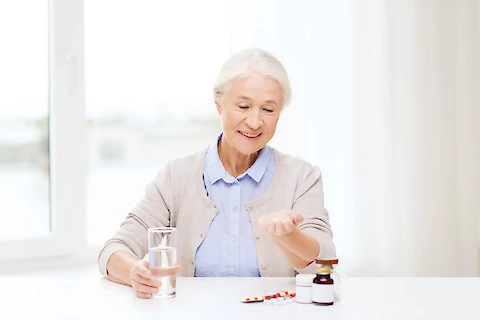
As seniors age, maintaining a strong immune system becomes increasingly important for overall health and well-being. One of the key factors in supporting seniors' immune systems is ensuring they get the right vitamins in their daily diet.
For seniors who have questions about vitamin supplementation or how to improve their overall immune health, they should always consult their doctor for more information.
Essential Vitamins for Boosting Seniors' Immune Systems
A strong immune system relies on a variety of vitamins that can be obtained through different sources. These include:
Vitamin C
Vitamin C is famous for its immune-boosting properties. It helps to stimulate the production of white blood cells, which are crucial for fighting off infections. Citrus fruits, such as oranges, lemons, and grapefruits, are abundant in Vitamin C. Other sources include strawberries, kiwi, bell peppers, and leafy greens like spinach and kale. Incorporating these foods into seniors' daily diets can help ensure they're getting enough Vitamin C to support their immune systems.
Vitamin D
Vitamin D is essential for immune system function, as well as for maintaining strong bones and teeth. Our skin naturally produces Vitamin D when exposed to sunlight. However, seniors often spend less time outdoors or have difficulty absorbing vitamin D. This makes it important to include dietary sources to meet their needs. Fatty fish, such as salmon, mackerel, and sardines, are rich in vitamin D, as are egg yolks and fortified dairy and cereal products. Seniors should also talk to their healthcare provider if they're concerned about their vitamin D levels and whether supplements may be necessary.
Vitamin E
Vitamin E is a powerful antioxidant that helps to protect our cells from damage caused by free radicals. It also supports immune system function by promoting the activity of natural killer cells, which help to ward off viruses and bacteria. To get enough Vitamin E, seniors should add foods such as almonds, sunflower seeds, hazelnuts, and vegetable oils (like sunflower and safflower oil) to their diet.
Vitamin B6
Vitamin B6 plays a vital role in immune system function by supporting the production of antibodies and other immune cells. A deficiency in this vitamin can lead to a weakened immune response in seniors. Some of the best food sources for Vitamin B6 include fish (especially tuna and salmon), chicken and turkey, chickpeas, bananas, and fortified cereals.
Vitamin B12
Vitamin B12, also known as cobalamin, is essential for maintaining a healthy immune system and nerve function. It is primarily found in animal products, such as fish, meat, poultry, and dairy. Seniors, especially those following a vegetarian or vegan diet, should ensure they are getting enough B12 through fortified plant-based products or supplements, if necessary.
How Seniors Can Ensure Adequate Vitamin Intake
A balanced diet is essential for ensuring seniors get all the necessary vitamins and nutrients for a strong immune system. Focus on incorporating a variety of fruits, vegetables, lean proteins, and whole grains into their meals, while limiting processed foods and added sugars. In some cases, healthcare professionals may recommend supplements to support seniors' nutritional needs. Be sure to consult with a doctor before taking any new supplements and choose products from reputable brands.
How to Research Vitamins and Supplements
When it comes to researching vitamins and supplements, it's essential for seniors to rely on reputable sources. Here are a few resources to help seniors make informed decisions about their nutritional needs:
- National Institutes of Health (NIH) Office of Dietary Supplements. This resource provides comprehensive information on a variety of vitamins and supplements. They also have information on recommended daily allowances and potential interactions with medications.
- ConsumerLab.com. This independent organization tests and reviews supplements for quality, purity, and effectiveness, providing valuable information for consumers.
- Dietary Supplement Label Database. This database allows seniors to search for information on various dietary supplement products to better understand their ingredients and intended uses.
Understanding the importance of essential vitamins for seniors' immune systems is crucial for maintaining overall health and well-being. With the knowledge of these key vitamins and their sources, seniors are better equipped to make informed decisions about their own dietary habits. Don't hesitate to seek guidance from healthcare professionals or utilize trusted resources when researching supplements.
Maintain a Healthy Lifestyle and Quality of Life
In many cases, getting the right vitamins can go a long way toward helping seniors live a longer, healthier lifestyle. However, they may also find that they need more assistance at home as they age.
For seniors located in Pittsburgh, Bethel Park, Bridgeville, Allegheny County, or Washington County, consider contacting Senior Helpers Southwest Pittsburgh for additional support and resources, including help with basic self-care, companionship, and more.